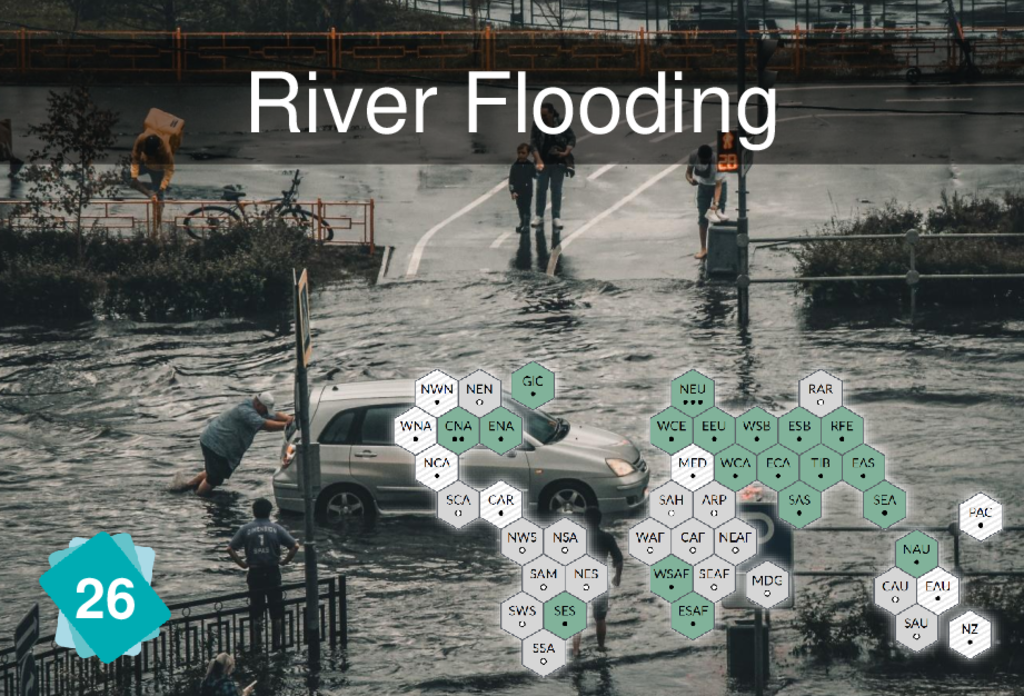En-en adult card 26 river flooding
Card #26: River Flooding
| Causes | Consequences | |

|
The disruption of the water cycle can bring more water or less water. More water can lead to river flooding.
If the soil has been dried out by a drought, it makes things worse because the water runs off.
Explanation
A flood is the temporary rise in the level of a river due to precipitation (whether local or upstream) or melting snow or ice.
Facilitation advice
Players can be asked what the difference is between flooding and Marine Submersion. Floods come from rain and rivers, whereas marine submersion comes from the sea.
Correction
Causes
Consequences
Other possible links
Other causes
- Melting of glaciers It is possible, under certain circumstances of high heat, that the rapid melting of glaciers may cause flooding. But the real concern about these glaciers is that they are gradually disappearing, depriving downstream irrigation of a top-up in summer.
- Deforestation Vegetation retains water. If it is cut down, flooding is more likely.
- Building usage Artificialization of the soil is also responsible for flooding because the soil no longer drains away excess water.
To go further
Occurrences of this phenomenon
June 2019
In Indonesia, nearly 6,000 people have fled their homes in the northern Konawe, an Indonesian province in Southeast Sulawesi, following heavy flooding that submerged parts of the region, known for its mining and plantation activities. 3,676 hectares of rice fields were destroyed[1]. The link with Decline in Agricultural Yields and Climate Refugees can also be seen here
January 2020
Nine people died in Jakarta in floods, the authorities announced on Wednesday, January 1, after torrential rains during New Year's Eve. According to the authorities, about 13,000 people have been evacuated but this figure does not include the inhabitants of Jakarta's satellite cities. "We are in the process of carrying out the evacuations," Jakarta governor Anies Baswedan told the press. "All those living near rivers must expect flooding"[2].
March 2020
Here is a non-exhaustive list of different examples of floods around the world:
- 4 March 2020: Hundreds of people in northern Namibia are displaced or missing as a result of flooding.
- 6 March: 53 deaths in Rwanda due to heavy rains that led to flooding. 800 houses, 23 roads, 17 bridges destroyed, 200 hectares of agricultural land lost and thus a new manifestation of Decline in Agricultural Yields.
- 9 March: 42 dead in south-east Brazil following a flood that caused a landslide.
- 9 March: 28 dead and 65 injured following heavy rains in Khyber Pakhtunkhwa in north-west Pakistan, an example of disruption of the water cycle.
- 14 March 2020: 3 people die in a landslide following heavy rains in Darjeeling, India.
- 17 March 2020: 3,000 houses and 7,000 hectares of agricultural land destroyed by flooding in Tanzania.
- 19 March 2020 : Flooding in Duhok, Iraq destroys 400 homes and 200 vehicles.
- 22 March: 10 dead and hundreds of people forced to move, becoming Climate Refugees following flooding in Papua New Guinea.
- 23 March: 700,000 people are displaced by flooding in Zambia awaiting food aid.
- 25 March 2020: 14 people die in 7 provinces of Iran and 2000 homes are destroyed in the Kerman region due to flooding.
- Whole month 1600 people displaced in Burundi due to floods.
Late March/early April 2020
80,000 people have been affected by floods in the Democratic Republic of Congo, leaving at least 25 dead. Those left homeless by the floods find themselves exposed to infection and disease. The risk of cholera, endemic in the region, is increasing. The province of South Kivu also hosts nearly 50,000 Burundian Climate Refugees out of a total of 500,000 throughout the country. Local authorities are working to build shelters, latrines and water and sanitation facilities, highlighting the problems related to freshwater resources[3].